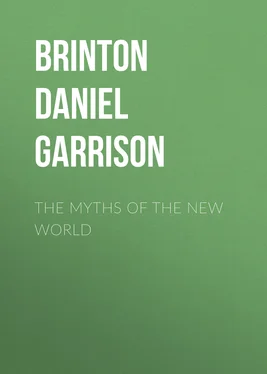Daniel Brinton - The Myths of the New World
Здесь есть возможность читать онлайн «Daniel Brinton - The Myths of the New World» — ознакомительный отрывок электронной книги совершенно бесплатно, а после прочтения отрывка купить полную версию. В некоторых случаях можно слушать аудио, скачать через торрент в формате fb2 и присутствует краткое содержание. Жанр: foreign_prose, История, Старинная литература, Мифы. Легенды. Эпос, foreign_edu, foreign_antique, на английском языке. Описание произведения, (предисловие) а так же отзывы посетителей доступны на портале библиотеки ЛибКат.
- Название:The Myths of the New World
- Автор:
- Жанр:
- Год:неизвестен
- ISBN:нет данных
- Рейтинг книги:5 / 5. Голосов: 1
-
Избранное:Добавить в избранное
- Отзывы:
-
Ваша оценка:
- 100
- 1
- 2
- 3
- 4
- 5
The Myths of the New World: краткое содержание, описание и аннотация
Предлагаем к чтению аннотацию, описание, краткое содержание или предисловие (зависит от того, что написал сам автор книги «The Myths of the New World»). Если вы не нашли необходимую информацию о книге — напишите в комментариях, мы постараемся отыскать её.
The Myths of the New World — читать онлайн ознакомительный отрывок
Ниже представлен текст книги, разбитый по страницам. Система сохранения места последней прочитанной страницы, позволяет с удобством читать онлайн бесплатно книгу «The Myths of the New World», без необходимости каждый раз заново искать на чём Вы остановились. Поставьте закладку, и сможете в любой момент перейти на страницу, на которой закончили чтение.
Интервал:
Закладка:
They occurred, as we might expect, in the two most civilized nations, the Quichuas of Peru, and the Nahuas of Tezcuco. It is related that about the year 1440, at a grand religious council held at the consecration of the newly-built temple of the Sun at Cuzco, the Inca Yupanqui rose before the assembled multitude and spoke somewhat as follows:—
“Many say that the Sun is the Maker of all things. But he who makes should abide by what he has made. Now many things happen when the Sun is absent; therefore he cannot be the universal creator. And that he is alive at all is doubtful, for his trips do not tire him. Were he a living thing, he would grow weary like ourselves; were he free, he would visit other parts of the heavens. He is like a tethered beast who makes a daily round under the eye of a master; he is like an arrow, which must go whither it is sent, not whither it wishes. I tell you that he, our Father and Master the Sun, must have a lord and master more powerful than himself, who constrains him to his daily circuit without pause or rest.” 50 50 In attributing this speech to the Inca Yupanqui, I have followed Balboa, who expressly says this was the general opinion of the Indians ( Hist. du Pérou , p. 62, ed. Ternaux-Compans). Others assign it to other Incas. See Garcilasso de la Vega, Hist. des Incas , lib. viii. chap. 8, and Acosta, Nat. and Morall Hist. of the New World , chap. 5. The fact and the approximate time are beyond question.
To express this greatest of all existences, a name was proclaimed, based upon that of the highest divinities known to the ancient Aymara race, Illatici Viracocha Pachacamac, literally, the thunder vase, the foam of the sea, animating the world, mysterious and symbolic names drawn from the deepest religious instincts of the soul, whose hidden meanings will be unravelled hereafter. A temple was constructed in a vale by the sea near Callao, wherein his worship was to be conducted without images or human sacrifices. The Inca was ahead of his age, however, and when the Spaniards visited the temple of Pachacamac in 1525, they found not only the walls adorned with hideous paintings, but an ugly idol of wood representing a man of colossal proportions set up therein, and receiving the prayers of the votaries. 51 51 Xeres, Rel. de la Conq. du Pérou , p. 151, ed. Ternaux-Compans.
No better success attended the attempt of Nezahuatl, lord of Tezcuco, which took place about the same time. He had long prayed to the gods of his forefathers for a son to inherit his kingdom, and the altars had smoked vainly with the blood of slaughtered victims. At length, in indignation and despair, the prince exclaimed, “Verily, these gods that I am adoring, what are they but idols of stone without speech or feeling? They could not have made the beauty of the heaven, the sun, the moon, and the stars which adorn it, and which light the earth, with its countless streams, its fountains and waters, its trees and plants, and its various inhabitants. There must be some god, invisible and unknown, who is the universal creator. He alone can console me in my affliction and take away my sorrow.” Strengthened in this conviction by a timely fulfilment of his heart’s desire, he erected a temple nine stories high to represent the nine heavens, which he dedicated “to the Unknown God, the Cause of Causes.” This temple, he ordained, should never be polluted by blood, nor should any graven image ever be set up within its precincts. 52 52 Prescott, Conq. of Mexico , i. pp. 192, 193, on the authority of Ixtlilxochitl.
In neither case, be it observed, was any attempt made to substitute another and purer religion for the popular one. The Inca continued to receive the homage of his subjects as a brother of the sun, and the regular services to that luminary were never interrupted. Nor did the prince of Tezcuco afterwards neglect the honors due his national gods, nor even refrain himself from plunging the knife into the breasts of captives on the altar of the god of war. 53 53 Brasseur, Hist. du Mexique , iii. p. 297, note.
They were but expressions of that monotheism which is ever present, “not in contrast to polytheism, but in living intuition in the religious sentiments.” If this subtle but true distinction be rightly understood, it will excite no surprise to find such epithets as “endless,” “omnipotent,” “invisible,” “adorable,” such appellations as “the Maker and Moulder of All,” “the Mother and Father of Life,” “the One God complete in perfection and unity,” “the Creator of all that is,” “the Soul of the World,” in use and of undoubted indigenous origin not only among the civilized Aztecs, but even among the Haitians, the Araucanians, the Lenni Lenape, and others. 54 54 Of very many authorities that I have at hand, I shall only mention Heckewelder, Acc. of the Inds. p. 422, Duponceau, Mém. sur les Langues de l’Amér. du Nord , p. 310, Peter Martyr De Rebus Oceanicis , Dec. i., cap. 9, Molina, Hist. of Chili , ii. p. 75, Ximenes, Origen de los Indios de Guatemala , pp. 4, 5, Ixtlilxochitl, Rel. des Conq. du Mexique , p. 2. These terms bear the severest scrutiny. The Aztec appellation of the Supreme Being Tloque nahuaque is compounded of tloc , together, with, and nahuac , at, by, with, with possessive forms added, giving the signification, Lord of all existence and coexistence (alles Mitseyns und alles Beiseyns, bei welchem das Seyn aller Dinge ist. Buschmann, Ueber die Aztekischen Ortsnamen , p. 642). The Algonkin term Kittanittowit is derived from kitta , great, manito , spirit, wit , an adjective termination indicating a mode of existence, and means the Great Living Spirit (Duponceau, u. s.). Both these terms are undoubtedly of native origin. In the Quiche legends the Supreme Being is called Bitol , the substantive form of bit , to make pottery, to form, and Tzakol , substantive form of tzak , to build, the Creator, the Constructor. The Arowacks of Guyana applied the term Aluberi to their highest conception of a first cause, from the verbal form alin , he who makes (Martius, Ethnographie und Sprachenkunde Amerika’s , i. p. 696).
It will not seem contradictory to hear of them in a purely polytheistic worship; we shall be far from regarding them as familiar to the popular mind, and we shall never be led so far astray as to adduce them in evidence of a monotheism in either technical sense of that word. In point of fact they were not applied to any particular god even in the most enlightened nations, but were terms of laudation and magniloquence used by the priests and devotees of every several god to do him honor. They prove something in regard to a consciousness of divinity hedging us about, but nothing at all in favor of a recognition of one God; they exemplify how profound is the conviction of a highest and first principle, but they do not offer the least reason to surmise that this was a living reality in doctrine or practice.
The confusion of these distinct ideas has led to much misconception of the native creeds. But another and more fatal error was that which distorted them into a dualistic form, ranging on one hand the good spirit with his legions of angels, on the other the evil one with his swarms of fiends, representing the world as the scene of their unending conflict, man as the unlucky football who gets all the blows. This notion, which has its historical origin among the Parsees of ancient Iran, is unknown to savage nations. “The idea of the Devil,” justly observes Jacob Grimm, “is foreign to all primitive religions.” Yet Professor Mueller, in his voluminous work on those of America, after approvingly quoting this saying, complacently proceeds to classify the deities as good or bad spirits! 55 55 Geschichte der Amerikanischen Urreligionen , p. 403.
Интервал:
Закладка:
Похожие книги на «The Myths of the New World»
Представляем Вашему вниманию похожие книги на «The Myths of the New World» списком для выбора. Мы отобрали схожую по названию и смыслу литературу в надежде предоставить читателям больше вариантов отыскать новые, интересные, ещё непрочитанные произведения.
Обсуждение, отзывы о книге «The Myths of the New World» и просто собственные мнения читателей. Оставьте ваши комментарии, напишите, что Вы думаете о произведении, его смысле или главных героях. Укажите что конкретно понравилось, а что нет, и почему Вы так считаете.












